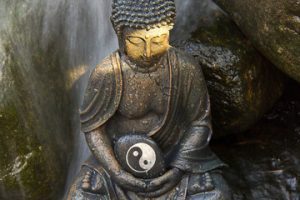What Is “Qi”?
If you’ve ever experienced acupuncture or seen a physician who uses Traditional Chinese Medicine, you may have heard the word “qi” before (TCM). In TCM, qi, which is pronounced “chee,” is likely the most significant element.
Everything you need to know about qi, including how to regulate it and determine whether you have a deficiency in it, is provided below.
What is Qi?
TCM has undergone 2,500 years of evolution, during which time it has developed into a very sophisticated and extensive system of rational medicine with a wide range of ideas and applications. But its fundamental goal is to comprehend and promote harmony in human life.
It is founded on the straightforward tenet that any harmonious system tends toward sustainability, well-being, and good health. An unbalanced system is more prone to ailment, disease, pain, and collapse.
Dr. Jill Blakeway, an expert in acupuncture and Chinese medicine, claims that the majority of significant cultural traditions refer to a “vital energy” that directs a person’s bodily and mental functions. It is referred to as prana in Indian culture. It is referred to as pneuma in Greek culture. It is referred to as qi in Chinese culture.
Chinese philosophy refers to this life force as qi and describes it as the body’s innate intelligence — the immeasurable but measurable means by which we maintain what is known as homeostasis, or the ability of the body to regulate its internal environment to create good health, according to Blakeway.
According to Blakeway, those with insufficient qi will likely feel exhausted and as though some of their body’s systems are malfunctioning. This could indicate anything from digestive issues, loss of appetite, and a propensity for colds to allergies, anemia, and melancholy. An emotional imbalance of qi is also possible. For instance, according to Sperber, fear can distribute qi while rage can cause it to stagnate.
There may also be too much qi. People with excessive qi may come out as agitated, anxious, or uptight. Additionally, Sperber claims that if you ever feel discomfort, your qi is probably “stuck.” Acupuncture can help with this because the purpose of the needles is to move your trapped qi.

What is TCM as a system?
Everything that gives origin to and maintains a system constitutes it. Everything is dependent on and connected to one another. A system is said to be in harmony if all of its components are in tune with one another. One disturbance might cause a ripple effect throughout the entire system.
This idea holds true for all kinds of systems. For instance, it pertains to people just as much as it does to families, communities, or the environment. As a result, we must be careful to think through our choices and view the bigger picture.

What are the underlying ideas?
Qi, or “vital energy,” and yin and yang are two distinctive and important ideas in Chinese medicine (the harmony of all the opposite elements and forces that make up existence). What we might refer to as the “roots” of Chinese medicine are these two ideas. The fundamental ideas and theories concerning the interactions between yin and yang and Qi that make up the “stems” of Chinese medicine spring from these roots. The rest of TCM theory and practice, including the reasons for disharmony patterns that create the “branches,” is based on these guiding principles.

How does a person control their qi?
Qi can be controlled in a variety of ways because it is involved in every bodily function. Your qi prognosis will probably be favorable if you breathe, eat, and sleep well, according to Sperber. He claims that if you don’t carry out these three steps, your qi won’t be able to flow properly and you’ll likely continue to struggle with your current health issue. In order to control your qi, Sperber continues, it is essential to stay away from harmful interactions.
If you believe your qi is out of balance, you can start to control it by:
- Getting enough quality sleep
- Regular exercise should include breathing exercises like those found in yoga.
- Preserving a healthy eating routine
- Preserving your mental wellbeing
In the case that your problems require a different kind of treatment, it’s also advisable to speak with a Western medicine physician.
If you believe your qi is out of balance, there are many methods you can restore it. Listed below are a few of the most popular techniques:
- Get sufficient sleep
A qi deficit is characterized by fatigue. One of the most vital things you can do to regulate your qi is to get seven to nine hours of undisturbed sleep every night.
Moreover, living more slowly can play a significant role in qi balancing. Your qi can be out of balance if you’re continuously busy and on the go. Avoid multitasking as much as possible, and always remember to take breaks.

- Practice breathing
Through deliberate breathing, a qi shortage can be remedied. If you find it difficult to breathe deeply, you may be anxious, which may result in a qi deficiency. You can practice a variety of breathing techniques to balance your qi. Diaphragmatic breathing, often known as belly breathing, is one technique. Either standing or lying down are options.

- Try qi gong or tai chi
One of the most important aspects of qi management is gentle exercise. Not only can it relieve stress, but it can also provide your body with the necessary mild motion. Tai chi and qi gong are two popular martial arts used to balance one’s qi. These two exercises can help with breathing, balance, relaxation, mental health, knee and back problems, and other things.

- Maintain an even diet
An essential element of having balanced qi is eating a balanced, nutritious diet. The majority of the qi in the body is derived from food, thus it is essential to nourish your body with wholesome meals that are healing and support proper digestion.
Avoiding cold meals, raw foods, fried foods, dairy items, and junk food are common nutritional therapy for qi balancing. It is suggested to steam, grill, or roast one’s food. It is also encouraged to consume “warming” foods like chicken, ginger, whole grains, bamboo, and mushrooms.

